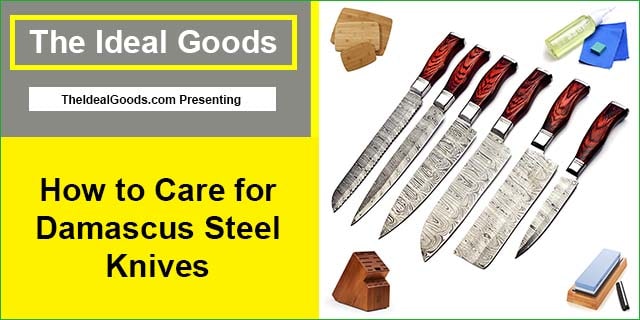Damascus steel knives require special care for different intensities of use. Being subject to weathering and use, these knives need much attention to keep them sharp (both actually and visually!).
Because of the beauty of Damascus steel, some people are content to use these types of knives as a heritage in their homes.
Many professional chefs regularly use Damascus steel kitchen knife sets and the methods they use to take care of Damascus steel knives are discussed below.
Overview of Best Way to Maintain Damascus Steel Knife
Rule-1: Use a Cutting Board
Rule-2: Clean and Wash Wisely
Rule-3: Lubricate Regularly
Rule-4: Remove Rust
Rule-5: Store Properly
Rule-6: Sharpen When It Necessary
Before scrolling down I would like to inform you that I have reviewed some knives made with Damascus Steel, if any of these are needed for your kitchen then you can take a look at them if you want.
- Best Damascus Steel Chef Knives
- Best Damascus Steel Cleaver Knives
- Best Damascus Steel Steak Knives
- Best Damascus Paring Knives
Rule-1: Never Use Damascus Steel Kitchen Knife Without a Cutting Board
Damascus Steel Knives should also not be used on hard surfaces. Metal, ceramic, glass, granite, and porcelain can cause the edge to chip or become dull. So every time an appropriate cutting board should be used.
As much as the sharpness of your knife matters, the material of your cutting board matters. Bamboo, wood, and plastic cutting boards are perfect to protect the knife Damascus Steel blade from damage.
Also, after cutting food items, do not use the sharp edge of the blade to scrape them into a pot or bowl. This can harm the edge or cause nicks. Use the spine of the blade or another tool to scrape it.
Rule-2: Clean and Wash Damascus Steel Knives Wisely
Whether it is simply put on display or used to field-dress a buck, a Damascus steel knife will require cleansing before long.
A little warm water and dish soap are all you need to wash your knife after each use. Just like when cleaning any knife, never put a Damascus steel blade in the dishwasher or it will return to you covered in nicks.
Also avoid abrasives such as steel wool when cleaning Damascus steel kitchen knives, as they will mar the acid-etched design. Never soak the knife in water, and dry it completely after washing to inhibit corrosion.
Rule-3: Lubricate Regularly to Prevent Rust
Once a Damascus steel kitchen knife has been washed and dried, it is time to oil or wax the blade as well as the tang part. Lubricating the knife keeps moisture away, which prevents rust from developing.
You need only oil display knives once a year. Do not use olive oil because it will become rancid. Instead, select a mineral oil.
Rule-4: Remove Rust From Damascus Steel Knives
If despite your best efforts rust should develop, remember not to use abrasive steel wool.
Attempt to loosen up the rust with apple-cider vinegar, a baking soda paste, or lemon juice, then rub the knife with a soft cloth.
You may also try sticking the blade in a whole potato, which has rust-removing properties due to its content of oxalic acid.
Rule-5: Store the Damascus Steel Knives Properly
Although many Damascus steel knives are sold in a leather sheath, this is not the ideal storage for your valuable kitchen knife.
During its production, leather is exposed to chemicals that will react with moisture in the air and oxidize your knife.
Keep Damascus steel kitchen knife in a location with a relatively constant temperature, such as a padded pouch or box.
This container should also protect the knife from moisture, but do not try to achieve this condition with a dehumidify bar because it may crack a wooden handle.
If you do place your knife in a leather sheath, be sure to protect it first. This can be done by covering the blade in plastic wrap.
Also, those who are regular users can use a plastic sheath or wood Saya cover or block or drawer as an alternative.
If you want to store the Damascus Steel knife for a few weeks or months, you must first oil it well and then store it.
Rule-6: Sharpen Damascus Steel Knife Only When It Necessary
For those who are basically amateur chefs, for easy kitchen knife maintenance, the blade should be sharpened as soon as it starts showing signs of dullness.
It is unwise to make one’s maiden voyage into the world of knife-sharpening with a Damascus steel blade.
Genuine Damascus steel kitchen knives are pricy because of the labor-intensive process used to forge them, so a sharpening slip-up can cost you hundreds of dollars. Either send your knife to a professional, or practice on your common kitchen knives first.
Thankfully, Damascus steel blades hold their edge extremely well and do not require frequent sharpening, so the cost of hiring a sharpening professional should not deter you from owning Damascus steel knives.
This type of knife prefers the whetstone method of sharpening; the electric sharpener or self-sharpening knife block is not as precise.
If you have experience sharpening knives by hand, determine what angle your Damascus blade needs, prepare your whetstone, and sharpen the knife just as you would any other.
Summary
A Damascus steel kitchen knife can be called nothing less than a treasure. With a hard, flexible blade, a handsome look, and a historical backstory, it delivers the complete package of delight to the knife-lover.
Despite all the assets which set it apart, a Damascus steel blade does not require much more upkeep than any other knife.
Simply treat it with respect. Offer it a cleaning, protection, and a dry place to stay, and your Damascus steel will be right at home.
